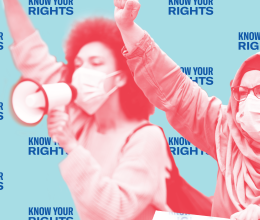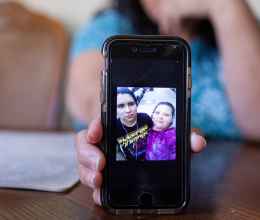
A U.S. District Court has ruled that the Orange County District Attorney must give alleged gang members due process rights. This is a major, one-of-a-kind victory for the ACLU of Southern California and its co-counsel, the law firm of Munger, Tolles & Olson LLP, who jointly tried the case Vasquez v. Rackaukas.
A federal judge ruled that the Orange County District Attorney and the City of Orange Police Department violated due process by enforcing a gang injunction against individuals who had never been given a hearing on whether they were gang members, and ordered police and prosecutors not to enforce the injunction against more than sixty individuals.
The injunction prohibits affected persons from ordinary activities such as going out in public after 10 p.m. or being in public in the presence of others suspected of being gang members, including immediate family members. The injunction covers 3.78 miles in the City of Orange, including its historic downtown area with upscale stores and restaurants, city hall and the public library, Chapman University, and a large hospital.
Police and prosecutors originally sought a gang injunction in February 2009, against the Orange Varrio Cypress street gang and more than one hundred alleged members. After nearly sixty people named as suspected gang members appeared or tried to appear in court to argue that they were not gang members, prosecutors dismissed them from the case and obtained the injunction by default only against the gang and those individuals who never appeared in court.
But soon afterward, the District Attorney and police began serving the injunction on the very same people that had been dismissed from the case, on grounds that they were suspected of being part of the enjoined gang.
In ruling that applying the injunction to those individuals violated due process, the Court held that being subject to a gang injunction significantly restricts a person’s basic liberties, and that whether or not someone is a gang member is a complex factual question that should not be left to the sole discretion of police and prosecutors to decide.
“Today’s decision means that police and prosecutors can’t impose special sets of rules on the people they decide are gang members, without providing a meaningful hearing as the Constitution requires,” said Hector Villagra, executive director of the ACLU/SC.
“The way the District Attorney’s office made these determinations should make the public very nervous,” said Belinda Escobosa Helzer, director of the Orange County office of the ACLU/SC. “This method of cracking down on gangs ensnares innocent victims and threatens to take away their most basic freedoms.”
The plaintiffs’ right to due process is guaranteed by the Fourteenth Amendment. Manuel Vasquez and Miguel Lara, plaintiffs in the case, testified how they avoided even such basic activities as going to public parks or restaurants with their families or participating in protests of the gang injunction, for fear of being arrested for violating the injunction’s terms.
“Police and prosecutors cannot take it on themselves to throw out someone’s most basic civil liberties, just because they think that the person might be a gang member,” said ACLU/SC Staff Attorney Peter Bibring. “Allowing police and prosecutors unchecked discretion to decide who is and is not subject to an injunction invites abuse and profiling.”
Touted by law enforcement as a tough and necessary crime fighting tool, aggressive gang injunctions have been used largely in poor communities of color with little proven effect. In pursuing the injunctions, law enforcement has eroded community trust, separated childhood friends and endangered the basic rights of people who have never been proven to be gang members to move freely and associate with whomever they like.
“Today’s ruling re-affirms one of the bedrock principles of our system and our society--that before a individual’s liberty is taken or restricted, the individual has a right to a hearing before a neutral decision-maker,” said Joseph Ybarra of Munger, Tolles & Olson, LLP.






